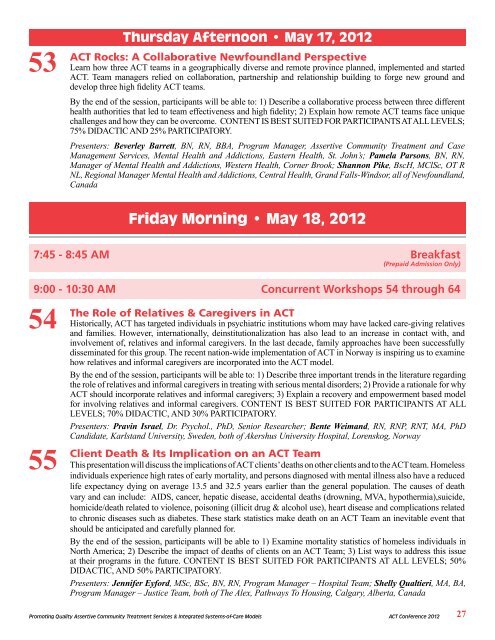2012 ACT Conference Brochure Online - Assertive Community ...
2012 ACT Conference Brochure Online - Assertive Community ...
2012 ACT Conference Brochure Online - Assertive Community ...
Create successful ePaper yourself
Turn your PDF publications into a flip-book with our unique Google optimized e-Paper software.
53<br />
54<br />
55<br />
Thursday Afternoon • May 17, <strong>2012</strong><br />
<strong>ACT</strong> Rocks: A Collaborative Newfoundland Perspective<br />
Learn how three <strong>ACT</strong> teams in a geographically diverse and remote province planned, implemented and started<br />
<strong>ACT</strong>. Team managers relied on collaboration, partnership and relationship building to forge new ground and<br />
develop three high fidelity <strong>ACT</strong> teams.<br />
By the end of the session, participants will be able to: 1) Describe a collaborative process between three different<br />
health authorities that led to team effectiveness and high fidelity; 2) Explain how remote <strong>ACT</strong> teams face unique<br />
challenges and how they can be overcome. CONTENT IS BEST SUITED FOR PARTICIPANTS AT ALL LEVELS;<br />
75% DID<strong>ACT</strong>IC AND 25% PARTICIPATORY.<br />
Presenters: Beverley Barrett, BN, RN, BBA, Program Manager, <strong>Assertive</strong> <strong>Community</strong> Treatment and Case<br />
Management Services, Mental Health and Addictions, Eastern Health, St. John’s; Pamela Parsons, BN, RN,<br />
Manager of Mental Health and Addictions, Western Health, Corner Brook; Shannon Pike, BscH, MClSc, OT R<br />
NL, Regional Manager Mental Health and Addictions, Central Health, Grand Falls-Windsor, all of Newfoundland,<br />
Canada<br />
Friday Morning • May 18, <strong>2012</strong><br />
7:45 - 8:45 AM Breakfast<br />
(Prepaid Admission Only)<br />
9:00 - 10:30 AM Concurrent Workshops 54 through 64<br />
The Role of Relatives & Caregivers in <strong>ACT</strong><br />
Historically, <strong>ACT</strong> has targeted individuals in psychiatric institutions whom may have lacked care-giving relatives<br />
and families. However, internationally, deinstitutionalization has also lead to an increase in contact with, and<br />
involvement of, relatives and informal caregivers. In the last decade, family approaches have been successfully<br />
disseminated for this group. The recent nation-wide implementation of <strong>ACT</strong> in Norway is inspiring us to examine<br />
how relatives and informal caregivers are incorporated into the <strong>ACT</strong> model.<br />
By the end of the session, participants will be able to: 1) Describe three important trends in the literature regarding<br />
the role of relatives and informal caregivers in treating with serious mental disorders; 2) Provide a rationale for why<br />
<strong>ACT</strong> should incorporate relatives and informal caregivers; 3) Explain a recovery and empowerment based model<br />
for involving relatives and informal caregivers. CONTENT IS BEST SUITED FOR PARTICIPANTS AT ALL<br />
LEVELS; 70% DID<strong>ACT</strong>IC, AND 30% PARTICIPATORY.<br />
Presenters: Pravin Israel, Dr. Psychol., PhD, Senior Researcher; Bente Weimand, RN, RNP, RNT, MA, PhD<br />
Candidate, Karlstand University, Sweden, both of Akershus University Hospital, Lorenskog, Norway<br />
Client Death & Its Implication on an <strong>ACT</strong> Team<br />
This presentation will discuss the implications of <strong>ACT</strong> clients’ deaths on other clients and to the <strong>ACT</strong> team. Homeless<br />
individuals experience high rates of early mortality, and persons diagnosed with mental illness also have a reduced<br />
life expectancy dying on average 13.5 and 32.5 years earlier than the general population. The causes of death<br />
vary and can include: AIDS, cancer, hepatic disease, accidental deaths (drowning, MVA, hypothermia),suicide,<br />
homicide/death related to violence, poisoning (illicit drug & alcohol use), heart disease and complications related<br />
to chronic diseases such as diabetes. These stark statistics make death on an <strong>ACT</strong> Team an inevitable event that<br />
should be anticipated and carefully planned for.<br />
By the end of the session, participants will be able to 1) Examine mortality statistics of homeless individuals in<br />
North America; 2) Describe the impact of deaths of clients on an <strong>ACT</strong> Team; 3) List ways to address this issue<br />
at their programs in the future. CONTENT IS BEST SUITED FOR PARTICIPANTS AT ALL LEVELS; 50%<br />
DID<strong>ACT</strong>IC, AND 50% PARTICIPATORY.<br />
Presenters: Jennifer Eyford, MSc, BSc, BN, RN, Program Manager – Hospital Team; Shelly Qualtieri, MA, BA,<br />
Program Manager – Justice Team, both of The Alex, Pathways To Housing, Calgary, Alberta, Canada<br />
Promoting Quality <strong>Assertive</strong> <strong>Community</strong> Treatment Services & Integrated Systems-of-Care Models <strong>ACT</strong> <strong>Conference</strong> <strong>2012</strong><br />
27




